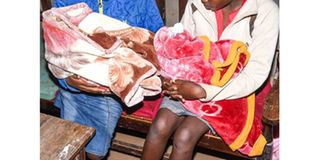Activists rebuke cleric for barring breastfeeding, pregnant girls from school

Teen mothers.
What you need to know:
- Bishop James Ssebagala of Mukono said no pregnant or breastfeeding girls would be allowed back in schools run by the church.
- Archbishop Stephen Kaziimba Mugalu also argued that schools lacked the capacity to manage health risks pregnant girls are likely to face.
Human rights groups have condemned as discriminatory and sexist, the directive by the Bishop of the Church of Uganda barring pregnant and breastfeeding girls from resuming learning in schools run by the church.
Bishop James Ssebagala of Mukono Diocese has been widely criticised after his order last Saturday at St Paul’s Church, Kanjuki, in Kayunga District, was quoted in an article published in the Daily Monitor, a publication of the Nation Media Group, as saying: “All head teachers, I want to tell you that we shall not allow pregnant or breastfeeding girls in class.”
In a statement on Tuesday, the church’s Archbishop Dr Stephen Kaziimba Mugalu also argued that schools lacked the capacity to manage health risks pregnant girls are likely to face in the first trimester.
Gender disparities
The remarks negated not only the country’s education policy permitting pregnant girls or teen mothers to continue learning but also the vision of Agenda 2063 under which African governments have committed to eliminating gender disparities at all levels of education.
“Leaving no girl behind means that we should recommit to… human rights-compliant policies at all levels to protect pregnant and adolescent mothers’ right to education,” tweeted Center for Health, Human Rights and Development, a Ugandan-based human rights organisation, in response to Mr Ssebagala’s directive.
Equality Now added that “Uganda must remain strong in ensuring that every girl has the right to education.”
Tanzania
This is, however, not the first time the right of girls’ access to education in Africa is threatened. In 2017, former Tanzanian President John Magufuli, who died in March last year, reinforced a ban on admission of pregnant girls, saying, as quoted in The Guardian: “As long as I am president … no pregnant student will be allowed to return to school … After getting pregnant, you are done.”
The following year, five schoolgirls aged between 16 and 19 were arrested for being pregnant, sparking an uproar from women rights groups, which accused Magufuli’s administration of prosecuting victims of sexual exploitation and violence.
In November last year, Education minister Joyce Ndalichako said the government would allow teen mothers to resume learning two years after delivery. But girls would still not be allowed in school while pregnant.
Kenya
Here in Kenya, despite the enforcement of the return-to-school policy for pregnant and teen mothers, they are subjected to unbearable stigma from fellow learners and teachers.
Women rights groups call for prevention of teenage pregnancies rather than waiting to punish the girls for sexual crimes committed against them.
“These bans are usually steeped in social cultural norms that arbitrarily require girls to remain chaste, yet studies have shown sexual abuse to be a major factor in adolescent pregnancy,” Equality Now Africa regional coordinator Judy Gitau told nation.africa on Thursday.





